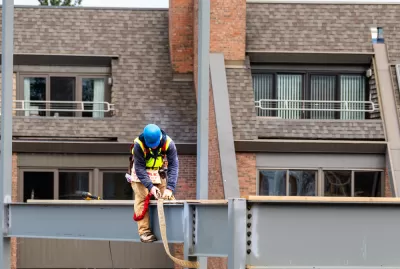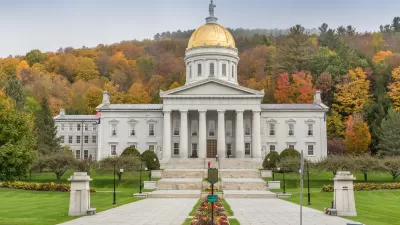New research quantifies the effect of parking reforms implemented by the city of Buffalo in 2017.

"One of the most promising trends in urban planning is the push from a growing number of U.S. cities to reduce minimum parking requirements for new developments," writes Eric Jaffe.
Proof of the promise of parking reform can now be found in Buffalo. Because large-scale efforts to reduce parking minimums are still relatively few, Buffalo's status as an early adopted of parking reforms make it one of the few locations that has been undertaking the experiment long enough to provide data for evaluation.
A new study of Buffalo, which cut parking requirements citywide in 2017, shows that many developers will indeed build less parking if given the chance. The work, set for publication in the Journal of the American Planning Association, finds that mixed-use developers, in particular, “readily took advantage of the newfound possibility to include less off-street parking.” The 14 mixed-use projects tracked by the study provided 53 percent less parking than previously required — with four projects building no parking at all.
Study authors Daniel Baldwin Hess and Jeffrey Rehler, urban planning researchers from SUNY-Buffalo, write that the data prove that cities of all kinds stand to benefit from relaxed parking requirements. "Conversion of excess off-street parking spaces to such 'higher uses' benefits not only municipalities such as Buffalo looking to introduce a denser (and more walkable) urban form but also highly urbanized areas where developable land is limited," write the duo.
FULL STORY: Buffalo ended parking requirements. What did developers do next?

Maui's Vacation Rental Debate Turns Ugly
Verbal attacks, misinformation campaigns and fistfights plague a high-stakes debate to convert thousands of vacation rentals into long-term housing.

Planetizen Federal Action Tracker
A weekly monitor of how Trump’s orders and actions are impacting planners and planning in America.

In Urban Planning, AI Prompting Could be the New Design Thinking
Creativity has long been key to great urban design. What if we see AI as our new creative partner?

Cal Fire Chatbot Fails to Answer Basic Questions
An AI chatbot designed to provide information about wildfires can’t answer questions about evacuation orders, among other problems.

What Happens if Trump Kills Section 8?
The Trump admin aims to slash federal rental aid by nearly half and shift distribution to states. Experts warn this could spike homelessness and destabilize communities nationwide.

Sean Duffy Targets Rainbow Crosswalks in Road Safety Efforts
Despite evidence that colorful crosswalks actually improve intersection safety — and the lack of almost any crosswalks at all on the nation’s most dangerous arterial roads — U.S. Transportation Secretary Duffy is calling on states to remove them.
Urban Design for Planners 1: Software Tools
This six-course series explores essential urban design concepts using open source software and equips planners with the tools they need to participate fully in the urban design process.
Planning for Universal Design
Learn the tools for implementing Universal Design in planning regulations.
Appalachian Highlands Housing Partners
Gallatin County Department of Planning & Community Development
Heyer Gruel & Associates PA
Mpact (founded as Rail~Volution)
City of Camden Redevelopment Agency
City of Astoria
City of Portland
City of Laramie





























